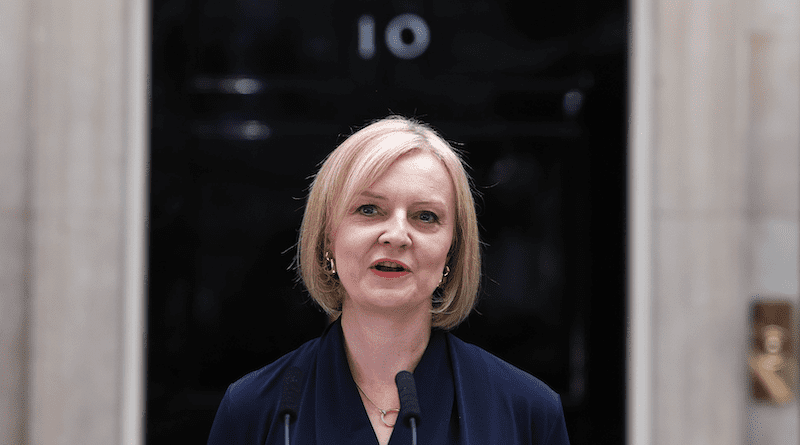Liz Truss And The West: A Failed Former Prime Minister Speaks – OpEd
It is unfortunate that column space should be dedicated to Britain’s shortest termed prime minister and, arguably, one of its most imbecilic and cringingly juvenile. But given that some people still sympathise with her and her views, it falls to one to tackle her latest work which resembles other types of the gloomy genre warning that action, if not taken now, will result in civilisational catastrophe.
From the outset, the premise of Ten Years to Save the West is confused. She declares the work is not a political memoir so much as “a call to action for fellow conservatives who believe in our nation and our way of life and who share my frustration at what has been going wrong with our politics and governance.” But the aggrieved memoirist, rather than a sound political thinker, dominates the narrative.
In Ten Years to Save the West, Truss gives us what The Daily Telegraph describes as a “romp”. Certainly, it is not like other prime ministerial accounts more likely to induce a mild coma or soporific escape. She did have a mere 49 turbulent days in Number 10, a time so short it did not enable her to move in her furniture. During that spell, she managed to tank the British economy and cripple the Tory party. In a span of just over a month, her policies pushed 13% of Tory voters towards Labor.
Truss never tires of telling us that everything was stacked against her. In all the ministerial positions she occupied in government, she claims to have been a radical stymied by a host of forces. She faced opposition in the education portfolio. As environmental secretary, she battle Tory colleagues afflicted with “climate fever” while fighting off the Marxist climate lobby. She might have secured a UK-US Free Trade Agreement with the Trump administration were it not for her wretched colleagues.
Whatever undercooked notions she had – a loose collection of economic musings that came to be called Trussonomics – she laments the “sheer power of the administrative state and its influence on the markets and the wider polity”. But she has the order the wrong way around. The very markets that she sees as the state’s salvation – at least in terms those operating in them – had no confidence in her. It was her Tory idol, Margaret Thatcher, who endorsed the view that the state had a minimal role to play when it came to meddling in finance and money markets. Release the forces, cut back the state’s fetters. The libertarian Truss got exactly what she deserved.
With stunning incoherence, Truss is convinced that those forces at work were all infected by a left-wing virus, from the administrative wonks and lever pullers in White Hall to humble teachers and charity workers. Not that questionable, eccentric, even idiotic policies don’t find an audience in self-defeating bureaucracy. They always do, and always will. As an example of the latter Truss cites environmental policies that led to the construction of a “bat bridge” at considerable increased cost to expanding one of the local roads under her charge.
The shrill, unhinged analysis by Truss in this half-manifesto, half-lament, is mysteriously capable of identifying the left-wing virus in such conservative institutions as the International Monetary Fund, the Bank of England, the Treasury, and the Office for Budget Responsibility, bodies that found her promises of indulgent unfunded tax cuts in the September 2022 budget unworkable, even dangerous. Throughout, she draws on the thesis of former US president Donald Trump of the “Deep State” that managed to hold her “at gunpoint”, one made up of a progressive and Marxist alliance that hates growth and cherishes decline.
A few observations, at a pinch, should be taken seriously. The poor trappings of a British PM’s office are noted. Truss makes the point that discharging its heavy burdens are made nigh impossible by institutional impediments. The modern British prime minister “is treated like a president but has nothing like the kind of institutional support for the office that we would expect in a presidential system”. But Truss tends to spoil such observations with trivial whines: that she had to do her own hair and make-up.
She also complains about the media saturated, short-term horizon that characterises the workings of Downing Street. This is a tad rich coming from the same individual who made such extensive use of social media in her various postings, be it jogging in New York or driving a tank in military gear in Estonia. During her stint as Foreign Secretary, she uploaded upwards of 700 pictures or more a day in what came to be derided as Instagram diplomacy.
The warnings for Truss’s demise were many. Many came from close to home. Her husband, Hugh O’Leary, predicted that her stint as prime minister would “all end in tears” though “accepted that this was the moment I was expected to run and that if I didn’t, people would say I had bottled it”. She even writes of her Norfolk constituency political agent’s harsh assessment: “I should run – but he thought it would be best if I came second”. The late Queen Elizabeth II, whose discussions with the prime minister of the day are, according to convention, never disclosed, is documented as giving the following advice: “Pace yourself.” Truss concedes that she “should have listened”.
This grossly, at times embarrassingly uneven thesis of Western doom and necessary salvation, wrapped up in personal resentment, is unlikely to do much to change matters in the corridors of power. But its occasional slips of candour and frequent revelations of sharp incompetence suggest that Truss’s 49 days in office were 49 days too many.

